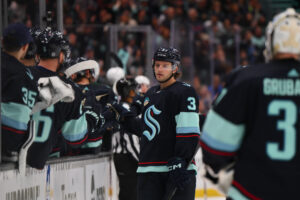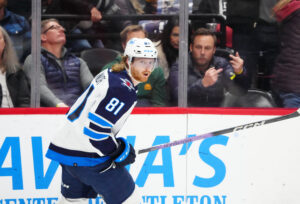The San Jose Sharks have a new, interim head coach in Bob Boughner. The Sharks fired Peter DeBoer along with his assistants Steve Spott, Johan Hedberg and Dave Barr. We’ve previously covered DeBoer’s failings – his dismissal is anything but out of the blue. The Sharks had not won a game this December under DeBoer – they hadn’t even held a lead. Even the Sharks successful month of November came despite underlying problems.
We’ll cover DeBoer’s tenure in the near future, but now is time to look at what Boughner must do to succeed. In the Sharks first game under Boughner, the Sharks fell to the New York Rangers by a 6-3 count, remaining 0-for-December.
Sharks general manager Doug Wilson has a remarkable track record, but he took his time in dismissing DeBoer. If there is one message surrounding the coaching change, it is urgency. Bob Boughner, fairly or not, has little time to deliver a major turnaround. How can he do it? We’ll offer up a guide to some much-needed moves.
The Sharks Goalies
The first change Boughner needs to make is in goal. DeBoer rode Martin Jones hard during his tenure (by far the league’s most used goalie) and Jones delivered less and less. Last season, Jones was most often, mediocre. This season, mediocre (I’m being kind here) is again the norm.
It is time to hand the nets to another. As of now, the lone “other” is Aaron Dell. Dell has done nothing to win the netminding job. Jones, however, has clearly lost it. Only once in the DeBoer era did he hand the nets to Dell for a meaningful amount of time – corresponding with a Jones injury in early 2018. It worked out well; Dell went 4-1-1 over a 13-day stretch.
Goalies often find a groove and play well for extended periods. Due to intermittent play, back-ups rarely get the chance to find this sort of groove. The Sharks have never given Dell the lead role. It is long past time to make this change and give Dell this opportunity. For the next month, he needs to be become the full-time starter. Longer if he succeeds.
Can Dell deliver? The odds aren’t great, but it is the road not yet taken. Dell has been good at times this season, even stealing a few games for the Sharks. Alas, he’s also delivered some stinkers. Given he’s started just eight games, there’s little definitive.
If Dell can take the job and deliver more often than not, the Sharks can take a positive step in two places. Jones needs to be rebuilt and perhaps he can work effectively with the Sharks new goalie coach Evgeni Nabakov. This process takes time and Jones can benefit from time off the ice.
During DeBoer’s tenure, the Sharks took only one basic approach, ride Martin Jones. Last season and this, it hasn’t worked. It isn’t working. The biggest risk is to continue on the current path. The time to change is now. Immediately.
Optimizing the Defensive Pairs
Before heading off on vacation in late November, I offered a final tweet. I looked at the Sharks best defensive pairings, as measured by Corsi For (CF%). I also included the Goals For/Goals Against (GF/GA) figures. Then I noted that none of these four combinations were actively used. The top two pairings were Brenden Dillon/Erik Karlsson and Marc-Edouard Vlasic/Tim Heed. What is shocking about this? In one sense, not much. Both pairings were used last season with great success. Their numbers this season are, again, quite good. The shocking part is how little the team uses these pairings.
The Sharks have successful pairings and for reasons which are genuinely baffling, ignore them. Even more frustrating, the Sharks could use three of the top four pairings in a game as they feature six different defenders (Brent Burns with Mario Ferraro ranked fourth best at the time of the tweet).
Instead the Sharks have locked into combinations which haven’t worked. This needs to stop. Again, the word immediately comes to mind.
One pairing, occasionally used, is Burns with Karlsson. It has been a problem. Under DeBoer, this season with this pair on the ice, the Sharks allowed four goals and scored just twice. In Boughner’s first game, following an icing, he deployed the pairing — and the Rangers scored making it two goals for and five against. Once again, stop doing this, it doesn’t work.
Balance the Forward Lines
The Sharks forward group has plenty of holes. In the offseason, we noted the Sharks middle class exited (a salary cap hangover from the Sharks all-in 2018-19 season playing a major role), leaving the team vulnerable. The ramifications are here.
The team’s lower lines have too little talent/skill to contribute in a meaningful way. There are no easy solutions, but Boughner did make a move hinting he gets the issue. He moved energetic forward Marcus Sorensen to the fourth line, giving the unit a chance to become a more meaningful contributor. Alas, this was his lone move on this front. Joe Thornton was moved from the third line to the second line and Barclay Goodrow (who has been all over the line-up, in a good way) took over the third line center role, but this was not done to create greater balance.
The Sharks bottom six to start the Boughner era included Goodrow, Patrick Marleau, Joachim Blichfield (in his NHL debut), Dylan Gambrell, Melker Karlsson and the aforementioned Sorensen. The team needs too many minutes from this talent-challenged group. Taking from the top six and adding to the bottom six will allow the team to skate more competitively over the course of the game. Boughner took a baby step in his debut, but he’ll need to take more and bigger steps very soon.
Fix the Power Play
There is too much talent for the Sharks power play to be as bad as it is. There’s too much talent for it to be anything other than elite. I won’t get into designs or personnel, but it is not working. Disaster might be too strong a word for some, but I’m comfortable using it. Lacking a middle class, the Sharks are a team dependent on high-end talent. There is no situation where the Sharks high-end talent needs to earn its pay more than the power play.
A resurgent power play alone won’t fix the Sharks problems, but it can sure cover for many of them. Right now, the Sharks need wins and the power play is an area which can turn on a dime. Boughner needs to make this to happen.
The Future is Now for Bob Boughner
Four seasons ago, Bob Boughner made his mark on the Sharks by turning Brent Burns into the defenceman he could be. It helped earn him his first NHL head coaching job with the Florida Panthers in 2017. Boughner’s two-tear tenure with the Panthers was hardly a failure, the team was reasonably competitive in a division where, talent-wise, it was outclassed.
For many NHL coaches, their first tenure is instructive while latter gigs brought them success. For Bob Boughner to have success in his new role as the Sharks head coach, he’ll need to make changes. Urgency matters, the Sharks are getting perilously close to forging a lost season. Given the team’s talent, this would be a sad turn of events.
Changes outlined here are places to start. There are other issues at hand. Can Nabakov help either goalie return to solid play? This is his first crack at an NHL coaching level. Can new associate coach Roy Sommer, the winningest coach in AHL history, help the Sharks younger players contribute more effectively and give the team a sorely-needed middle class? Can new assistant coach Mike Ricci, the ultimate grinder during his playing days, create enthusiasm for the intensity the Sharks require to make themselves relevant again?
If Bob Boughner intends to become the full-time head coach instead of the interim head coach, he’ll need to lead the team’s turnaround. It’d be nice to have time to get this done. Alas, time is one resource in short supply.
Zeke’s Notes
• Vlasic is set to play his 1,000th NHL game on Saturday, all with the Sharks. At plus-131 for his career, he trails only Joe Thornton in team history. Former Sharks forward Joe Pavelski sits just five games away from achieving his own 1,000 game milestone, having played his first 963 games for team teal.
• The Sharks waived depth forward Lukas Radil. Radil is emblematic of the Sharks challenge this season. With the team’s lack of middle class forwards, Radil was one of the candidates hoping to nail down a spot. He underachieved, not only failing to make the most of the opportunity, but taking a backwards step in his play as compared to last season. Unlike young players such as Gambrell and Blichfield, this was the make-or-break chance for the 29-year-old Radil. It is reported Radil is expected to wind up with the Sharks AHL team, the San Jose Barracuda. It would be a surprise, at least to me, if he ever returns to the Sharks.
Main Photo:






